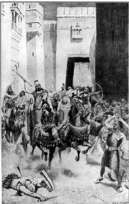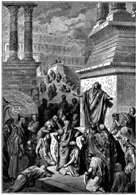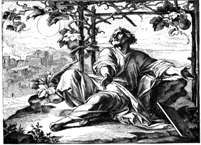Three Purposes of Prophecy
Written by Mike Bennett
 Two Minor Prophets provide major lessons about why God gives us predictions of the future.
Two Minor Prophets provide major lessons about why God gives us predictions of the future.
Part of the mission God gives His people involves getting His message out to this world. That message is a message of warning, a call for repentance and a message of hope and good news. Prophecy has always been a part of that message.
But why? Why does God give prophecies? I found some interesting insights into why God uses prophecy in two of the Minor Prophets.
Two tales of one city
Jonah and Nahum were both prophets who were given messages from God about Nineveh—a great city that represented the Assyrian Empire. The Assyrians were a brutal and greatly feared enemy of Israel. Both Jonah and Nahum were given prophecies about Nineveh’s destruction. But the books turn out much differently.
Jonah, who prophesied about 100 to 150 years before Nahum, would have been quite happy to see the vivid destruction that Nahum prophesied come to pass. But the story of Jonah adds additional depth to our understanding of what God is doing—and why.
Let’s look at what these two prophecies about Nineveh show us about three of God’s purposes of prophecy.
The events in the book of Jonah happened perhaps 50 years before Assyria took Israel captive. Even then, Assyria was a dreaded and cruel enemy. In Jonah 1:2 God told Jonah: “Arise, go to Nineveh, that great city, and cry out against it; for their wickedness has come up before Me.”
God hates wickedness, and He wants us to hate it too. And that leads us to a first purpose:
1. Prophecy shows God’s justice, and this is intended to lead us to repentance.
What wicked things had Assyria done? Jonah doesn’t give details, but Nahum later gives a list of some of the terrible things that Nineveh had long been known for.
- They conspired against God (Nahum 1:9).
- They were famous for crushing and harshly oppressing their enemies (1:13; 2:12).
- They were known for violence and lies (3:1).
- Nineveh “taught them all to worship her false gods” (3:4, New Living Translation). Verse 19 says, “Where can anyone be found who has not suffered from your cruelty?” (NLT).
 God is righteous and holy and just. He never minimizes sin or says it’s not so bad. His justice requires that He decry evil and point out that sin leads to suffering, destruction and death. He doesn’t want the humans He created to sin or die. God is “not willing that any should perish but that all should come to repentance” (2 Peter 3:9). We’ll come back to this aspect of God’s nature a little later.
God is righteous and holy and just. He never minimizes sin or says it’s not so bad. His justice requires that He decry evil and point out that sin leads to suffering, destruction and death. He doesn’t want the humans He created to sin or die. God is “not willing that any should perish but that all should come to repentance” (2 Peter 3:9). We’ll come back to this aspect of God’s nature a little later.
2. Prophecy shows God’s power—He always wins! This gives us encouragement.
Nahum prophesied 60 to 100 years after Israel had been cruelly taken captive by Assyria. This was 100 to 150 years after Jonah. In Nahum 1:3 it says: “The LORD is slow to anger and great in power, and will not at all acquit the wicked. The LORD has His way in the whirlwind and in the storm, and the clouds are the dust of His feet.”
God is patient—slow to anger. But in the end His power always wins. Even though people of that time worshipped the “god of storms”—who was called Baal by the Canaanites—God is the one really in control of the whirlwinds and storms. Not only could Jesus control the storms and walk on water, this seems to portray God as walking on the clouds!
In the end, God wins. The people of Nahum’s time needed this encouragement. The people facing the end-time “beast” power will need that encouragement. Understanding God’s power and that He always wins is important for us to understand more about God.
3. Prophecy shows God’s love.
 The story of Jonah is a familiar one. After Jonah tried to run away from God, ending up in a great fish for three days and three nights, he finally got the message and went to Nineveh. He told them they would be destroyed in 40 days for their wickedness. But in one of the very few occasions in the Bible, a group of people actually listened to the warning and repented! They fasted and turned from their wicked ways!
The story of Jonah is a familiar one. After Jonah tried to run away from God, ending up in a great fish for three days and three nights, he finally got the message and went to Nineveh. He told them they would be destroyed in 40 days for their wickedness. But in one of the very few occasions in the Bible, a group of people actually listened to the warning and repented! They fasted and turned from their wicked ways!
In Jonah 3:10 it shows God’s response: “Then God saw their works, that they turned from their evil way; and God relented from the disaster that He had said He would bring upon them, and He did not do it.”
This change of God’s plans shows God’s love. It shows that warnings of prophesied destruction are not given as revenge or angry retribution, but out of love and out of a desire for people to repent and change.
Seeing it from God’s perspective
 But Jonah did not understand and was very angry that his prophecy didn’t come to pass! So God set up an experiment—a demonstration. He used real “miracle grow” to make a leafy plant grow up to shade Jonah from the blistering heat. But then he sent a worm that killed the plant. And again, Jonah was very angry!
But Jonah did not understand and was very angry that his prophecy didn’t come to pass! So God set up an experiment—a demonstration. He used real “miracle grow” to make a leafy plant grow up to shade Jonah from the blistering heat. But then he sent a worm that killed the plant. And again, Jonah was very angry!
So God said, in effect: Jonah, if you could love a plant and feel sorry for it when you didn’t even plant or care for it, imagine how much more you’d love it if you put a lot of work into it. And imagine how much more if it was a pet, and especially a pet you had cared for and loved for years.
And imagine how much more you’d love it if it were a human being and especially someone you cared for for years! What about a family? A village? A city or nation? What if you had designed and created them and had plans to adopt them into your own family? What if each of them was a potential spirit being—a member of the God family?
We don’t know if Jonah learned the lesson, but I like to think he did, and that he was the one who wrote the book telling his own failings to help us to learn these lessons too.
So, from these two prophecies about Nineveh we gain a broader perspective of God’s thinking and of the purposes of prophecy. Prophecy shows God’s justice, His power and His great love. We can be thankful for all of those attributes as we strive to understand and become more like our great God!
For more about God’s great plan and what He prophesies will come, see our booklets The Mystery of the Kingdom and Holidays to Holy Days: God’s Plan for You.
Mike Bennett is a husband, father and minister of the Church of God, a Worldwide Association, who is eagerly awaiting the second coming of Jesus Christ.








